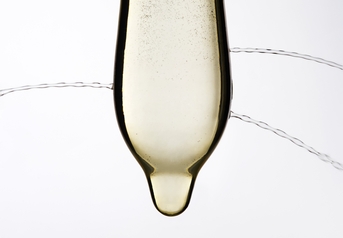Recently, the Health Department warned South Africans about the wave of fake condoms in circulation, especially in Gauteng. The South African Health Products Regulatory Authority regularly warns about counterfeit health products when they have been exposed, recently sending out a warning about the presence of counterfeit condoms.
News about fake condoms being sold in spaza shops in the townships first broke in December 2024. It was first reported by IOL after an investigation into the “studded variety with sky-blue packaging,” allegedly from Trust, according to an IOL news report.
Condoms are an integral part of South Africa’s efforts to curb the spread of sexually transmitted diseases, especially HIV and AIDS. They are very effective in preventing the risk of pregnancy and sexually transmitted diseases. Furthermore, they are a crucial and safe contraceptive against teenage pregnancy, an issue that is very widespread in South African working class communities.
Fake condoms may increase the risk of infection and pregnancy, as they may be made from unsuitable materials and do not have the same levels of lubrication or quality-control as the legitimate brands. This makes them a risk not only for infection but also injury to people using them.
The ‘studded’ variety of condoms identified by these reports, with subsequent Department of Health warnings confirming the presence of counterfeit condoms in circulation, are sold in spaza shops all over Johannesburg’s CBD.
With South Africa having one of the largest numbers of people living with HIV and AIDS, residents who are aware of these fake condoms are panicking.
Khosi from Booysens, Johannesburg, told Karibu! “I have heard that there are fake condoms, especially the ones bought from local shops.”
The mother of two felt that the presence of counterfeit condoms in local shops is quite worrying because it means people could contract diseases and experience unwanted pregnancies, as the fake versions are not proven to be effective contraceptives.
When asked if she knew how to tell apart the fake condoms from the authentic products, she responded that she “could not spot one, but it’s saddening because some people find themselves sick while they believe they are protected. So, imagine doing all you can to protect yourself, and someone selfish produces a fake product for profit while risking your life.”
Khosi said that the producers of these fake condoms should serve jail time.
Fake condoms are not unique to South Africa, as there have been reports of such products as far away as Nigeria. South Africa, for its part, cannot afford to take this practice lightly and needs to clamp down on it hard. Just 20 years ago, government policies allowed the uninterrupted spread of the disease, as Mbeki’s regime denied the link between HIV and AIDS.
This article was submitted on 11 February 2025. You may republish this article, so long as you credit the authors and Karibu! Online (www.Karibu.org.za), and do not change the text. Please include a link back to the original article.


 Download PDF
Download PDF